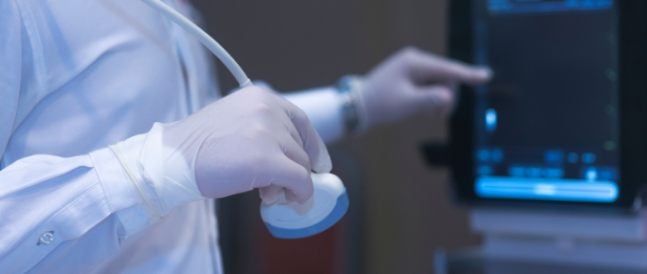Prerna Bajaj and her husband Ashwin, both in their mid-thirties, were trying to have a baby for six months. Unhappy with their unsuccessful attempts, they sought advice from Dr. Priti Arora Dhamija, Gynecologist and Fertility specialist at Sitaram Bhartia Hospital in Delhi.
After noting their medical history and performing a clinical examination, the doctor suggested a follicular study.
Realizing that the couple were not familiar with the term, she explained, “A woman’s ovaries contain many follicles. These are sacs composed of fluid and an immature egg. The follicles and the eggs grow during a menstrual cycle.”
“Every month, an alternate ovary releases a mature egg that travels through the fallopian tubes into the uterus. This process is called ovulation.”
“The lining of the uterus thickens as it prepares for pregnancy. When a sperm enters the uterus (from the vagina), and meets the egg, fertilization occurs. “
“This results in an embryo that will implant itself in the uterine lining and bring about a pregnancy.”
“If implantation does not occur, the uterine lining breaks down and is shed through menstruation.”
Watch: Overview of the Female Reproductive System
Since ovulation is essential to the conception process, it is crucial to study the follicular growth when diagnosing fertility problems.
What is a follicular study?
A follicular study is done to track the growth of follicles in a woman’s ovaries. It is also known as a follicular scan or follicular monitoring.
This involves a series of scans to ascertain when the mature egg will be released and the uterine walls will thicken.
Follicular monitoring is essential for natural cycles and IUI/IVF procedures.
Prerna asked about the details of the study so she could understand it in-depth.
How is a follicular study done?
The most accurate way to perform a follicular study is through a transvaginal ultrasound. In this process, you will have to lie on your back with your legs raised and bent. The ultrasonologist will insert a probe into the vagina. The ultrasound will pick up images of the ovaries and follicles.
You will have to empty your bladder before the ultrasound scan as a full bladder can interfere with the results.
“Is the follicular study scan painful?” asked Prerna.
“The ultrasound does not hurt but it may feel uncomfortable to have the probe inside you,” shared Dr. Priti.
Ashwin wanted to know why the scan was required.
Why is follicular monitoring necessary?
Follicular scans are usually recommended to
- study the number of follicles
- observe the changes in the uterine lining
- determine the ovulation period so that intercourse/IUI/IVF procedure can be timed accordingly
- understand whether the dosage of any fertility drugs given is appropriate or needs to be changed
The process can also help identify any problems with the growth of follicles or other ovulation problems.
Women with PCOS who have irregular cycles and those above 35 years who’ve been trying to conceive for six months are also advised follicular scans.
Prerna asked whether there was a specific time that the ultrasounds need to be done.
When does a follicular scan have to be done?
The scans will start between day 9-11 of your cycle and will continue till ovulation. In all, about 5-6 scans may be required. After each sitting the interval between the next scan will be determined by your gynecologist. Usually scans are done on alternate days.
Ovulation normally occurs between day 13 – 17 but in some cases it can be delayed.
“Each ultrasound takes 5-10 minutes,” said Dr. Priti.
Prerna seemed doubtful when she learned that follicular monitoring wouldn’t be limited to just one scan. She became anxious as she thought about juggling work with ultrasound appointments.
Understanding the look of concern, Dr Priti, said “As long as you schedule your appointments prior to coming in, you won’t be spending much time here.“
Prerna’s stance relaxed when she heard those words. She then asked about the normal size of follicles required for pregnancy.
What should be the size of follicle to get pregnant?
For a pregnancy to occur you will need follicles that are 18-25 mm in diameter and a uterine lining that is good quality and more than 10 mm thick to hold the embryo.
Are there any side effects of a follicular ultrasound scan?
There are no direct side effects of a follicular study although constantly thinking and worrying about the follicle size, egg maturity and timing intercourse on a specific day may cause tension between some couples.
Dr. Priti emphasised that instead of getting stressed they should consider this an opportunity to understand their bodies better.
What is the cost of follicular study?
The follicular study is priced at ₹800 for a single sitting and ₹3280 for a package which may comprise anywhere between 2-5 sittings depending on your doctor’s suggestions.
All our scans are done with experienced ultrasonologists who use fresh gloves, probe covers and appropriate PPE to minimize the risk of any infection.
“When you’re thinking of having a baby, try not to focus on the specifics and instead concentrate your energies on remaining optimistic and happy and you will see that your positive frame of mind will get you through,” counselled Dr. Priti.
Pleased with the consultation, the couple booked their ultrasound appointment as advised by the doctor.
Now that they had clarity about the next steps, Ashwin and Prerna seemed confident to take on the journey toward parenthood.
Learn more about Fertility Services at Sitaram Bhartia
This article has been written with inputs from Dr. Priti Arora Dhamija, who has over 16 years of experience as a fertility specialist and obstetrician-gynecologist. She has received training from the Indian Fertility Society in Assisted Reproductive Technologies and fertility enhancing laparoscopy.

Dr. Priti Arora Dhamija, MBBS, Maulana Azad Medical College, Delhi (1999); M.D, Lady Hardinge Medical College (2004); DNB Obstetrics & Gynecology (2004); Diploma in Pelvic Endoscopy, Kiel, Germany (2014)
Interested in consulting Dr. Priti for your preconception journey? Fill in the form below or Chat with us on WhatsApp to schedule your consultation.
Liked this article? Follow us on Facebook, Twitter, Youtube and Instagram for more content!
You may also like to read:


